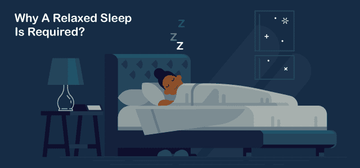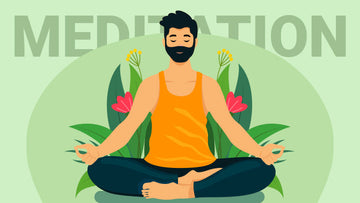Stress. Negative Emotions. Anger. And Overthinking. These ruin our sleep.
Living mindfully has become a relic of the past and with busy lifestyles, we rarely get time to hit the snooze button. Lack of restful sleep leads to insomnia, behavioural issues, and poor attention spans. Sleep isn't just about getting your shut-eye for the night and waking up. The quality matters.
Your sleep is divided into two phases - SWS (Slow Wave Sleep) and REM (Rapid Eye Movement). Slow Wave Sleep is the light sleep where your body temperature drops and it prepares for deep sleep. Brain waves slow down, growth and repair accelerate, and your mind transitions into lucid dreaming eventually or Rapid Eye Movement (REM). In the REM Stage, which lasts about 70 or 90 minutes, you get restful and relaxing sleep which wakes you up rejuvenated in the mornings.
How To Get Relaxed Sleep?
Your sleep goals should revolve around achieving the REM State and activating the relaxation response in your body. Here are a few tips for getting restful sleep:
1. Avoid Bluelight - Stay away from electronics and technology at least an hour before bedtime. Bluelight tricks the mind into staying awake and isn't good for trips to dreamland.
2. Exercise Everyday - At least a little. You don't have to go gung-ho on cardio or sprint marathons. Just a bit of low-impact exercises or taking a nice long walk in the evening is enough to prep your mind and body for bedtime.
3. Do Grounding Activities - Grounding activities are what connects us with nature. It makes us mindful and aware of our breath and surroundings. Grounding activities include drawing, doodling, making music, meditating, etc. You train your senses to be aware and it's a wonderful and relaxing experience. They also train your relaxation response.
4. Eat Healthily - If you're eating a lot of processed foods or junk every day, your sleep will pay the price. Eat lots of fruits, vegetables, berries, nuts/seeds, and take your supplements like B12 and D3, if needed. Talk to your nutritionist about optimizing your diet for sleep. Bananas and cherries are recommended before bedtime since they're known to aid sleep.
5. Use Sleep Supplements - Melatonin supplements are helpful in regulating and restoring natural sleep cycles. If you want recommendations, try out the Nveda Sleep-Aid supplement. It's made from natural ingredients and does not have any side effects with long-term use, unlike pharmaceuticals.
6. Take It Easy - Ultimately, relaxation will also boil down to your mindset. If you practice relaxing activities but believe you can't do it, you'll end up being unable to relax. Consider sitting down with a sleep therapist and write a journal every day to empty your thoughts on paper.
Affirmations have been proven to be helpful in retraining the mind to relax and get deep sleep. Or as the golden saying goes: read before bedtime. Do that, relax, and you'll be counting sheep in your dreams in no time.







